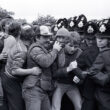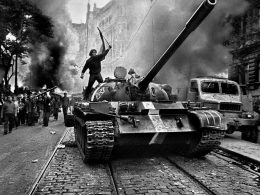Capitalism is based on the private ownership of production – the firms, workplaces and finance system. Under capitalism everything is a commodity that can be bought and sold. Basic necessities like food, water, clothing and housing all must be paid for and are a source of profit to the bosses or capitalist class – sold for more than they cost to produce or supply.
Workers are forced to sell their labour power (ability to work) to the bosses to earn the necessary wage for subsistence. The great contradiction of capitalism is that workers cannot buy back all of the products they produce which leads to over production and economic slump or recession. This is because workers are only paid a portion of the wealth they create. For example, to make a table worth a weeks wage may take only 1 day, after day 1 the worker does not finish for the week, they will continue working.
The products made on day 2, 3, 4 and 5 all become surplus for the boss and are a result of the unpaid labour of the worker. It is through this unpaid labour that the bosses draw their profits.
Obviously, a portion of the excess wealth created by the labour of a worker must be reinvested in maintenance and upgrade of equipment to compete with rival capitalists and increase the rate of profit (rate of profit not being actual profit but how much can be extracted from any given time of labour). This reinvestment tends to cause the rate of profit to fall initially i.e. a lesser proportion of return for amount of capital spent.
For the boss to raise the rate of profit they; either force unpaid overtime, freeze wages, speed up or increase workloads and even better for the boss, force wages down as far as possible. If this is still not enough we see a “flight of capital” where the bosses close down a factory and move it off shore to a country where labour costs are far lower and less regulated.
It is the struggle over the proportion of the share of the wealth produced that goes to the worker (wages) and that which goes to the boss (profit) that constitutes the “class struggle” While bosses try to force wages down, workers and their unions are trying to push them up, each fighting for a bigger piece of the pie.
Because capitalists own the means of production i.e. the machinery, materials and equipment needed to produce the particular product they sell, what, how and how much is produced is completely out of workers control, regardless of how it affects the broader society. The only factor for the boss is how much profit can be made. This can be seen in the famous words of Lord Stokes, ex-chairman of British Leyland “I’m in business to make money, not cars”.
As socialists, whilst we fight for better wages and conditions for workers, we also recognise that it is the whole system which must be replaced. Any gains won under capitalism are not permanent and can be taken back.
Only by creating a democratic socialist planned economy under the ownership and control of the working class can we not only end the mass exploitation of workers, but develop technology and production for the benefit of society and end the waste and destruction caused by the capitalist market system.












